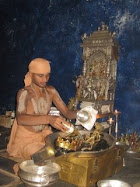पूज्याय राघवेंद्राया सत्यधर्म रतायाचा !
भजतां कल्पवृक्षाय नमताम कामधेनवे!!
Married life along with continued education
Upon returning from
Married Life - utter, dire poverty haunts venkaTanAtha
VenkaTanAtha�s brother arranged for his marriage with saraswathi, a lady from a good family. Saraswathi proved to be an ideal wife to VenkaTanAtha, and the couple had a son whom they named lakshmInArAyaNa.
VenkaTanAtha was a skilled musician and a great scholar, but he never demanded any money for his services and accepted whatever was offered to him. Since this happened very rarely, he had little or no means to support his family and had to endure a life of utter, dire poverty. A description of the hardhips faced by him will melt anybody�s heart. If other families observed EkAdashi twice a month, VenkaTanAtha�s family did that several times in a week. His poverty was so stark that he could not afford a drop of oil to take an oil-bath on a festival day like dIpAvali. His family did not see new clothes for years. Inspite of all this, he never lost his equanimity or wavered in his faith towards the Lord. He continued his self-study, and free teachings, determined to live by whatever came to him unsought and unasked.
Playing with fire - disrespecting a true hari bhakta
VenkaTanAtha once attended a wedding. Since he was poor and not well dressed, the hosts did not treat him well. They thought that he had come for the free food and wanted him to earn his meal. To this end, they asked him to grind sandalwood and generate the paste, to which he readily agreed. Out of habit, he started reciting vedic sUktas while grinding. Soon, the task was done and the paste was handed over to the Brahmins attending the function. When they applied the paste to their bodies, they experienced a strong burning sensation. On further enquiry it was found that unknowingly VenkaTanAtha had recited agni sUkta while grinding the paste. The Brahmins immediately understood that the VenkaTanAtha was a divine personality and his recitation of agni sUkta had invoked the presence of agni in the paste. The host begged VenkaTanAtha for forgiveness and asked him to generate some paste while reciting varuna sUkta. When this paste was applied, the burning subsided. Such was the potency of mantras recited by VenkaTanAtha.
The point to note is that he did not deliberately do this out of anger or sorrow at the host�s disgusting behavior. He took everything with equanimity and did what came naturally to him � pray to the Lord through vedic hymns. It was Divine will that the world at large should learn about the greatness of VenkaTanAtha, and that�s why he ended up reciting agni sUkta.
Collected by: U.D.















No comments:
Post a Comment